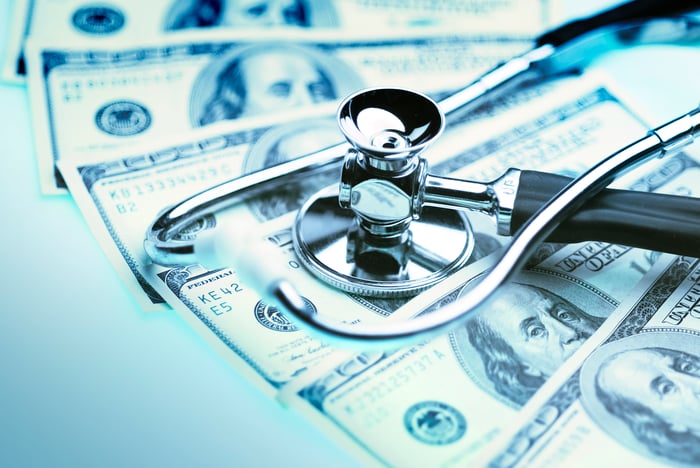There are few industries as hit-and-miss as biotech.
In many instances, the deck is stacked against biotech companies succeeding. Most discovery-stage, preclinical, and clinical trials fail to meet the mark, meaning most discoveries made in a lab won't make it to pharmacy shelves. However, the rare few drugs that do wind up being approved by the U.S. Food and Drug Administration (FDA) can make all the difference. If you happen to invest in a biotech stock with an approved drug, or multiple approved drugs, you could see your investment compound many times over.
For example, Pharmacyclics, which is now owned by AbbVie, soared more than 45,700% from its Great Recession lows in a span of six years due to the development of blockbuster blood cancer drug Imbruvica and the company's eventual $21 billion sale to AbbVie. Every single biotech investor is on the lookout for the next Pharmacyclics.

Image source: Getty Images.
Now that's what I call EPS growth!
Perhaps the hardest part in seeking out potential biotech investments is deciding where to begin. One group that might be worth considering is the biotech stocks poised to show the greatest year-over-year earnings per share (EPS) growth. The following three biotech stocks are all projected, based on Wall Street's consensus, to generate at least 415% EPS growth in 2018. Could they be worth spots in your portfolio?
Alkermes PLC -- 1,425% EPS growth
When it comes to year-over-year growth, no biotech stock can lay claim to a more robust pace than Ireland-based Alkermes (ALKS -1.04%). With expectations for $0.04 in full-year EPS in 2017, Wall Street will be looking for $0.61 in full-year EPS next year.
Unlike the other biotech stocks on this list, Alkermes is a bit of a dual threat. For a long time Alkermes made its living as a royalty-based company that took existing drugs and reformulated them into extended-release therapies. During the fourth quarter Alkermes reported $133.8 million in manufacturing and royalty revenue, representing a solid $14.5 million year-over-year increase.
More importantly, Alkermes also has a novel drug development pipeline filled with promising products. For instance, ALKS-5461, a drug designed to treat major depression, is currently in late-stage studies and, if all goes well, could be approved by the FDA and generating sales before the end of 2018. Various Wall Street analysts see ALKS-5461 delivering between $700 million and $1.2 billion in peak annual sales if approved.

Image source: Getty Images.
Alkermes is also working on ALKS-8700, a potential treatment for multiple sclerosis (MS), and ALKS-3831, a treatment for schizophrenia. The MS market is constantly evolving, and any approved MS therapy (if safe) probably has blockbuster potential.
Long story short, Alkermes is able to pad its profits with high-margin royalty revenue derived from its extended-release formulation contracts, but it could soon be generating the bulk of its sales and profits from novel therapies. The next year and a half will be pivotal for Alkermes, with the FDA likely weighing in on ALKS-5461, and a handful of late-stage products producing key results. If all goes well, Alkermes could be generating north of $3 in annual EPS by 2020, making this a biotech growth stock worth keeping on your radar.
Exelixis, Inc. -- 880% EPS growth
Another rapidly growing company that's near and dear to my heart (and also a long-term holding in my portfolio) is cancer-drug developer Exelixis (EXEL -1.66%).
Exelixis looked as if it was doomed following the failure of Cabometyx in a pivotal phase 3 study (COMET-1) for metastatic castration-resistant prostate cancer patients. The company even wound up cutting about 70% of its workforce in order to conserve cash. But it had a pretty abrupt reversal of fortune soon thereafter.
Results from its pivotal METEOR study in second-line advanced renal cell carcinoma (RCC) showed that Cabometyx had met its primary endpoint. Additional data releases would go on to show that Cabometyx hit the "trifecta" in treating second-line RCC: it provided statistically significant improvements in overall survival, progression-free survival, and objective response rate over the placebo.

Image source: Getty Images.
What's more, Exelixis' midstage CABOSUN trial demonstrated superiority of the current standard-of-care in first-line RCC, meaning there's a reasonable chance of a label expansion to the larger patient pool indication of first-line RCC in its future.
This year, the biggest question mark is what'll happen with the phase 3 CELESTIAL study. CELESTIAL is examining Cabometyx as a treatment for advanced hepatocellular carcinoma (liver cancer), and results are due out this year. Given additional combination therapies that Cabometyx is being examined in, it has a genuine shot at blockbuster sales.
The result for investors is the expectation of rapid EPS growth. Wall Street's consensus call is for just $0.05 in full-year EPS this year, but $0.49 in full-year EPS in 2018, representing growth of 880%! And that's hardly the end. Wall Street believes Exelixis could produce $1.58 in full-year EPS by 2020, making the stock quite the bargain even after its huge run-up over the past two years.
Incyte Corporation -- 417% EPS growth
Last but not least, don't forget about Incyte (INCY 0.19%), which has been powered forward by its myelofibrosis drug Jakafi and a deep pipeline of cancer drugs.
The strong growth Jakafi has delivered makes perfect sense: there are no FDA-approved drugs to treat myelofibrosis other than Jakafi, which is a JAK inhibitor designed to treat the most common symptoms of the disease, including an enlarged spleen. According to Incyte's fourth-quarter and full-year earnings report, the company generated $852.8 million in U.S. sales from Jakafi, a 42% year-over-year increase, and another $110.7 million in royalties from the sale of Jakavi in overseas markets (Jakavi is the drugs' overseas brand name). That's $963.5 million of its $1.11 billion in sales from a single drug.

Image source: Getty Images.
Nonetheless, this single drug is expected to push Incyte from a loss of $0.23 per share in 2017 to a full-year profit of $0.73 per share in 2018 -- good enough for a 417% EPS swing.
However, unlike Alkermes and Exelixis, this Fool isn't sold on Incyte's long-term prospects, and would strongly urge growth investors to be cautious.
For starters, last week Incyte and development partner Eli Lilly (LLY -0.64%) were dealt a setback when the FDA sent the duo a complete response letter (CRL) for once-daily baricitinib, a treatment for rheumatoid arthritis. The CRL, which is essentially a rejection that requests additional info, asks Eli Lilly and Incyte to provide additional dosing and safety trial information. In other words, it means running more studies, which will cost valuable cash and time.
Also worrisome is the fact that Geron and licensing partner Johnson & Johnson are developing a myelofibrosis drug of their own known as imetelstat. What makes imetelstat so intriguing is that in early stage studies it elicited partial and complete responses in patients. No clinical drug had ever previously elicited an objective response in myelofibrosis patients. If Geron's and Johnson & Johnson's drug is approved in 2019 or 2020, it could very easily gobble up nearly every cent of Jakafi's revenue stream since it treats the disease and not just the symptoms of the disease.
Though Incyte has shown incredible growth potential, investors would be wise to remain skeptical.




